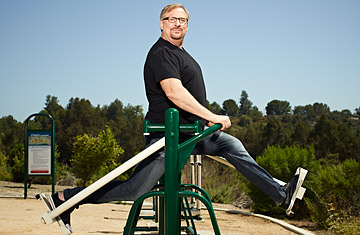
Pastor Power, Warren has lost 55 lb. so far, with 35 to go.
(4 of 6)
Nearby, a volleyball game is going on at the community center and restaurant known as the Refinery — recalling the biblical passages that refer to God's refining power. The building also has a basketball court and Frisbee golf course, and outdoor lights are in the works so members can play at night. An organic garden has been planted, and the harvest is used in the restaurant and in the food pantry that helps feed the needy. Not all the fare in the restaurant is healthy (Warren believes the program should neither be nor feel mandatory), but each selection does bear a green, yellow or red star indicating the degree of caution church members should exercise before choosing it.
Even doctors who don't agree with the religious element of the plan would find it hard to dispute that the overall regimen is well designed — and that this kind of program is badly needed everywhere. "By the end of this decade, there will be 50 million people per year dying worldwide from chronic, lifestyle-related diseases, compared with 20 million dying from infectious diseases," says Hyman. "These are things we could be preventing."
Taking It Wide
If churches can be a solution to the obesity problem, they also, in some ways, helped create it. Amen was a devoutly practicing Christian long before he became involved with the Daniel Plan. He recalls a day in 2010 when he entered the church he regularly attended and found doughnuts for sale and hot dogs and sausages cooking outside while the minister talked about the ice cream festival held the night before. Amen began scrawling notes to himself: "They have no idea they are sending people to heaven early. This has got to change."
He began praying for guidance, and just two weeks later, Warren called and asked him to participate in the Daniel Plan. "I'm thinking, No way," Amen says. "God does not usually answer my prayer that fast and in a big way."
Warren's idea of keeping the church in the game but using it to fix rather than create problems appealed to Amen, in part because it's applicable to all faiths. There's nothing that says a mosque can't have exercise classes and cooking demonstrations; there's nothing that says a synagogue can't have a website and small-group support. Other churches are already clamoring for the Daniel Plan, and a friend of Warren's who is a rabbi wants to offer the plan in his synagogue.
Tapping the church as an existing root system for health can be used in an even bigger way in the developing world, something that's central to a newly launched mission Warren calls the PEACE Plan, an acronym for planting churches around the world, equipping leaders, assisting the poor, caring for the sick and educating the next generation. A beta test for the PEACE Plan occurred in 2005, when Paul Kagame, President of Rwanda, moved by the message of The Purpose Driven Life, contacted Warren and told him he wanted to create a purpose-driven country.
